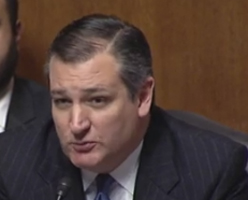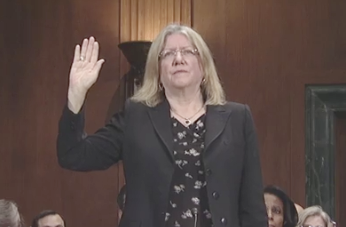ABA president defends ratings of judicial nominees after GOP senators claim liberal bias

Screenshot of Sen. Ted Cruz, R-Texas.
Updated: ABA President Hilarie Bass defended an ABA committee’s ratings of judicial nominees on Wednesday after GOP senators charged in a Senate Judiciary Committee hearing that liberal bias could be swaying the evaluations.
Bass said in a statement that the ABA “is a nonpartisan organization” and the ABA Standing Committee on the Federal Judiciary “has thoroughly vetted thousands of nominees using a fair and nonpartisan process that no other organization can match.”
The Republican senators made their accusations amid controversy over a “not qualified” rating given Leonard Steven Grasz, a Nebraska lawyer who is nominated to the St. Louis-based 8th U.S. Circuit Court of Appeals.
The ABA’s standing committee has said its rating stemmed from concerns that Grasz could not set aside a “passionately held social agenda” to respect precedent, including Roe v. Wade.
Evaluators said Grasz’s peers were impressed with his professional competence and acumen, but a significant number raised concerns that his views would make it impossible for him to have an open mind on critical issues on the bench, according to written statements by the standing committee (here and here).
Sen. Ted Cruz, R-Texas, claimed in a Senate Judiciary Committee hearing on Wednesday that the ABA is a liberal advocacy organization. The ABA has a right to take liberal stands, he said. “But I don’t believe an advocate with a stake in a particular outcome should be given a privileged role and be treated somehow as a neutral arbiter.”
Members of the ABA Standing Committee on the Federal Judiciary don’t make donations to federal candidates after they become committee members. But Cruz and Senate Judiciary Committee Chairman Chuck Grassley of Iowa said that, at the national level, committee members had previously given political donations mostly to Democratic candidates and organizations.
The committee’s 15 members had made at least 74 donations to federal political organizations and candidates, and 68 of those donations were made to Democratic candidates or political groups, the senators said. Five committee members had formerly donated to Republicans, but the amount was low and the donations were typically to local candidates. Four of those five had given more to Democrats than to Republicans, according to the senators.
Two committee members formerly donated to the group Emily’s List, which supports abortion-rights political candidates, and one of them was Bresnahan, Cruz said.

Pamela Bresnahan testifying before the U.S. Senate Judiciary Committee on Nov. 15.
Bresnahan said in an interview with the ABA Journal that Cruz neglected to mention she had donated to Newt Gingrich’s early run for president in the GOP primary race with Donald Trump, and she had also donated to two Republican gubernatorial candidates in Maryland.
Bresnahan pointed to the track record of her committee, which has given only four “not qualified” ratings to 53 judicial nominees evaluated so far this year. “From my perspective,” she said, “how can you say we’re biased one way or another when we have 49 qualified and well-qualified candidates?”
The ratings process “is not about our personal beliefs, but it is about what we cull from peer reviews,” she said.
Bresnahan testified during the hearing on Wednesday, but the two committee members who led the evaluations of Grasz were not called to testify. Bresnahan said the decision to exclude the evaluators was “disappointing to say the least.”
Perhaps some of the senators were more interested in making speeches than in discussing specifics about Grasz with the evaluators, she said.
One of the evaluators, Laurence Pulgram, has pointed out that Grasz changed his initial characterization of an Oct. 9 interview conducted during the review process. In a supplemental statement (PDF) released Wednesday, Pulgram alleged that Grasz had initially “cast the interview in a one-sided way.”
In Nov. 1 testimony to the Senate Judiciary Committee, Grasz had asserted that Pulgram referred to “you people” during the interview, and when asked to explain, Pulgram said the phrase referred to “conservatives and Republicans.”
Pulgram said he referred to “you guys” rather than “you people,” and it was part of a discussion in which Pulgram was trying to understand why Grasz believed trial lawyers had more influence on a nonpartisan judicial nominating commission in Nebraska. Grasz filed a document (PDF) with the Senate on Monday in which he acknowledged that Pulgram had said “you guys” rather than “you people.”
The judicial nominating commission had four Democrats and four Republicans. Grasz said he believed trial lawyers had more influence “because they care more,” according to Pulgram. Pulgram says he responded that “you guys are entitled to care just as much.” Pulgram said he intended “you guys” to mean anyone who was against the trial lawyers’ agenda.
See also: ABA committee member provides context to ‘you guys’ comment in Grasz interview
Bass gave a statement defending the ratings process to the ABA Journal after the hearing Wednesday. It reads in full: “The ABA is a nonpartisan organization and appoints members to the Standing Committee on the Federal Judiciary in a nonpartisan way. Committee members are named with a goal of diversity of background and area of law.
“The American Bar Association has been impartially evaluating federal judicial nominees since 1953. During those 64 years—through both Republican and Democratic administrations—the ABA’s Standing Committee on the Federal Judiciary has thoroughly vetted thousands of nominees using a fair and nonpartisan process that no other organization can match. Because federal judicial posts are lifetime appointments, ensuring that lawmakers have as much information as possible about candidates before approving them is critical. The federal judiciary is a fundamental part of our government and appointing the most qualified people to it is integral to our democracy.”
Related articles:
ABAJournal.com: “Second Trump judicial nominee gets ‘not qualified’ rating from ABA: What’s the rating process?”
ABAJournal.com: “ABA committee explains its ‘not qualified’ rating for 8th Circuit nominee”
ABAJournal.com: “8th Circuit nominee answers senators’ questions on ‘not qualified’ rating”
ABAJournal.com: “Amid controversy over judicial ratings, ABA committee chair will testify before Senate committee”
ABAJournal.com: “ABA committee member differs with judicial nominee Grasz on their discussion during interview”
Article updated at 7:40 a.m. to report that Grasz had acknowledged he said “you guys” rather than “you people.”



